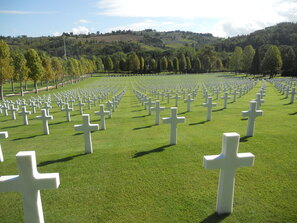 Art Spiegelman is a real-life graphic artist and illustrator who has founded, edited, and drawn avant-garde comics and magazines. He began researching a major project in the 1980s, deciding eventually on an intimate view of what happened to his Jewish parents in wartime Poland. The book he created, MAUS, Volumes I and II, covers his father’s life from a young man; his courtship and marriage to his mother, Anja; their hiding from the Nazis during the invasion of Poland; their capture and subsequent years of imprisonment at the Auschwitz-Birkenau concentration and extermination camp; and then into their later years. Art inserts himself into the story as the son of Vladek, and who is a graphics artist looking for fulfilment in creating a graphic novel of WWII. He needs the experience and activities of his father, but Vladek continually gets off track, making it difficult. Slowly but surely, Art draws out his parents’ history, while struggling to deal with his father as Vladek grows older, more self-centered, and more intolerable. What Art wants to do in his own life butts up against his responsibility for providing for his father (the current wife leaves Vladek because of his growing paranoia). Eventually, the reader experiences both stories: Vladek’s Holocaust experience and Art’s coming to grips with his own life with and without his father. MAUS is a graphic novel, which means that it has comic-book-type panels of drawings featuring cartoon-type characters in a physical context. Dialogue occurs in word balloons, while narration occurs across the top or bottom of the panel, or between panels. The highly detailed illustrations reveal far more than the dialogue. It is the perfect “showing” of the story rather than the “telling” of the story, and the reader sees far more in the pictures than the words say. Looking for a unique venue to convey the tragedy of the individuals, Spiegelman uses humans with mouse heads to portray Polish Jews, with pig heads for Polish non-Jews, with cat heads for Germans, and with dog heads for American soldiers. Don’t think this is a childish indulgence; his framework becomes surprisingly important and comfortable, while it enhances the identities of the different groups. Spiegelman’s artwork is superb and is amazingly effective in keeping the reader in the context of what’s going on, and what’s happening to who. I didn’t know that animal faces could convey such drama and emotion. MAUS is no comic book. There’s not a single KA-POW, SHAZAM, or Super Hero to be found. It has sections and chapters; it uses present time as well as flashbacks to tell the past; it allows the reader to hear the author’s thoughts; there’s a wide number of characters that give depth, understanding, and personality to the themes; the book covers a number of years, in a number of locales; and the story-line, though complex, is easy to grasp and pulls the reader along. The book is very novel-ish with regard to having themes that weave in and out as they resolve: the story of Art’s father and mother’s experiences of being Jews in war-time Poland, the present-day predicament of the author regarding his father, the overall portrayal of inmates living in Nazi death camp environments, and the elements of an enduring love story. It is also a personal book, the author absorbing his father’s past life while dealing honestly with the impact of his father’s present life on his own. Art is very open about his feelings. Congruent with what I’ve read, MAUS is as authentic to its wartime subject matter as you can get. I couldn’t verify the novel’s stories being the actual history of Art Spiegelman’s family, but I can tell you that it is spot-on with its description of the horrors of Nazi Poland. It is not a children’s book. Young readers will not be irreparably harmed by it, but it is raw when it comes to portraying institutional hate, incredible cruelty, disrespected and marginalized humanity, unimaginable circumstances, and other descriptors typically reserved for the Holocaust, the Nazis, and wholesale genocide. Kids can read it, but I hope they don’t. At the same time, I hope that young adults and adults read it and believe every word. It is an incredible combination of history and literature. There is a time and place for growing up and accepting reality, and I appreciate parental concerns with wanting to control that time and place. It’s a shame that “banning” a book serves as the only way to exert influence and control on public school literature, but it is a greater shame that there are those who are willing to sacrifice the innocence of childhood to propagate their own agendas. Not reading the book is a lost opportunity to see a real-time, personal episode of history and then to see the consequences of that history on the future of those involved. MAUS, the Holocaust, the unbelievable cruelty of war, and the cost of totalitarianism is now more pertinent to our perception of the world than ever before.
0 Comments
Leave a Reply. |
AuthorDon Willerton has been a reader all his life and yearns to write words like the authors he has read. He's working hard at it and invites others to share their experiences. |

 RSS Feed
RSS Feed